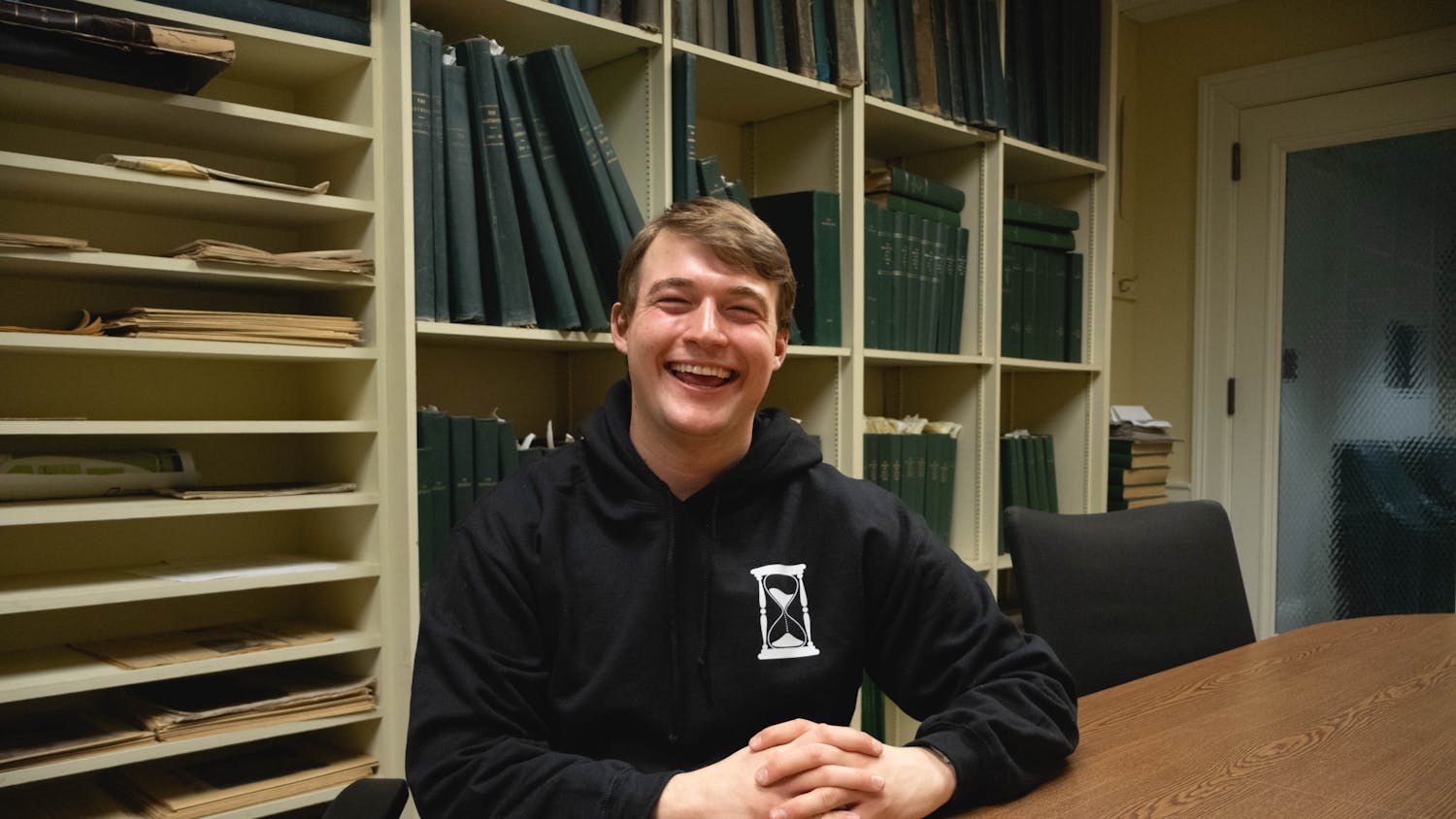Each year the mass of incoming freshmen is bombarded with resources to answer the millions of questions that arise during Orientation and the opening weeks of school.
Whether their questions are general or specific, Dartmouth's first-year students have a myriad of places to find advice, the foremost of which is the First-Year Office in Parkhurst Hall, the administrative building.
Although many students obtain much of their information from peers and upperclassmen, the sole function of the freshman deans is to aid and educate the temporarily clueless 'shmen.
'A sense of place'
Dean of First-Year Students Peter Goldsmith said deans are a valuable information resource for new students, and their job is to ease the transition to college life.
He said the deans offer social, academic and emotional counseling, and they often refer students to other resources.
"Students have to learn to find the motivation from within," Goldsmith said. "They have to develop a sense of place."
Assistant Dean of Freshman Gail Zimmerman said the deans answer questions concerning anything from majors to roommate dilemmas and social problems.
Dartmouth's long tradition of aiding freshmen in the transition to the College began with the first freshman deans in 1921. Dean Goldsmith is the ninth Dean of First-Year Students.
"The record suggests that Dartmouth has a long commitment to recognizing and understanding the challenges of incoming students," he said.
Goldsmith said the transition to college can be extremely difficult, even for the most prepared student, and he sees many cases of homesickness each year.
Finding a source of motivation is another problem, he said. During high school, students work to gain admission to colleges. But after achieving that goal, students are often unsure why they should continue to work hard, he said.
For many new Dartmouth students, approaching a dean with questions is not an easy task, Zimmerman said.
Most new Dartmouth students have trouble asking for help, since they may see it as a sign of weakness, Goldsmith said. However, students need to take advantage of the resources available at Dartmouth, including its deans, he said.
Finding the deans
Most '01s will probably first see one of the freshman deans at the Moosilauke Ravine Lodge during their Dartmouth Outing Club Freshman Trip.
Goldsmith said he enjoys that sort of informal interaction with students, since it allows the students to see him as a real person rather than just an administrative figure.
The freshman deans try to get out and meet as many of the freshmen as possible, as daunting as this task may seem.
Zimmerman said it is next to impossible for her to remember many of the students she meets during the whirlwind week of Orientation.
"The first couple of weeks are as hectic for us as they are for students," she said. "We try to make ourselves as visible as possible in a variety of settings."
Assistant Dean of First-Year Students Stephanie Hull said in an e-mail message that she has various methods of getting to know students on a more personal level.
"I do this by inviting students to come in for an appointment, but we also like to get out of the office and meet people by attending events around campus," Hull said. "We often get invited to lunch in the Fall term" by Undergraduate Advisors, the student dorm counselors for first-year students.
Goldsmith said "It's easy to see a freshman dean," but acknowledged that Parkhurst can be an intimidating building to the uninitiated.
"We try to encounter students in other settings," he said. "I'm always very open to a student who wants to meet over coffee."
Goldsmith added that all of the deans are available by BlitzMail, and they often use "blitz" as a way to invite concerned students to come talk to them.
Using the deans as a resource
"The dimension in which we are best trained ... and most under-utilized is in helping students to think about curriculum and course decisions," Goldsmith said.
He said each of the deans is extensively trained in one academic field and can provide general information about all other College departments.
Zimmerman said although the function of a dean inevitably overlaps somewhat with other advisors, including UGAs and faculty advisors, deans are primarily available for more general information, especially about academics.
"Our hope is that the UGAs will encourage students to talk to someone in our office whenever it's appropriate," Hull wrote.
Goldsmith said most students come in with academic issues, although some come in to discuss other problem areas, including discipline problems.
He said many Dartmouth students are actually contacted by the deans during the term, especially at the time of midterms, concerning their academic performance.
Contrary to popular belief, he said almost 10 percent of a class may receive letters notifying them of academic peril. Usually, the problem is resolved relatively quickly, he said.
"It's not a sign necessarily of deep trouble, but an opportunity to use the resources of the College to get back on track," Goldsmith said.
Disciplinary problems represent a much smaller percentage of visits, Getting to know students as people and understanding their plans and frustrations are integral parts of being a dean, Hull said.
Both Goldsmith and Zimmerman said some of their favorite conversations occur when students simply drop by to chat.
"Many people come in for help with personal problems, some not even Dartmouth-related," Hull said. "And still more stop in just to say hello, to meet a dean and get to know someone in this office just in case they do someday have a problem that they'd rather not explore with a complete stranger."
"Our ability to really help a student is limited by how much we know about that student prior to a crisis situation," Zimmerman said.
Zimmerman said she does not think students use the deans as a resource often enough, especially for difficult questions. She said she always encourages them to "use and abuse" the dean system often.
"Students should try to meet the deans as early as possible," she said.
Peter Goldsmith
Goldsmith came to Dartmouth four years ago from Princeton University, in response to an advertisement in the Chronicle of Higher Education.
"The position fit very well with my experience and background," he said.
"It's altogether met and exceeded my expectations," Goldsmith said of the College. He said he has been particularly impressed by the quality of Dartmouth's students and faculty.
In addition, he said Hanover and the College community have been the ideal place for him and his wife, who is also a member of Dartmouth's faculty, to raise their two children.
Goldsmith said his job also allows him to continue teaching, which is an important priority in his life.
"Students see a different side of me when I teach," Goldsmith said. "It's a way of conveying to students the value that I place on learning."
When his roles as a dean and a father leave him some extra time, Goldsmith said he enjoys playing music for contra-dances with his band, the Wachipauka Plunkers. He is also in the editing stages of a book he recently completed.
Goldsmith said he plans to stay at Dartmouth for some time to come.
"Dartmouth and Hanover are a community that my family and I have become very attached to," he said. "This job is going to continue to interest me and challenge me."
Gail Zimmerman
Zimmerman works both as an Assistant Dean and as a counselor in the Academic Skills Center, and she said she actually often gives the same advice in both positions.
She came to Dartmouth four years ago after working in a teaching hospital.
Zimmerman was born and raised in Buffalo, N.Y., earned an undergraduate degree in biology and worked at the University of Wisconsin and Texas Christian University.
"I enjoy working with the students," Zimmerman said. "I enjoy helping students negotiate the system, and I enjoy the higher education environment."
Zimmerman said she has plenty to occupy her time these days, including her one-year-old daughter, her two campus positions and her work on her doctoral degree.
"I have a very busy life, as most students do," she said.
In her free time, Zimmerman said she also enjoys cross-country skiing and the winters here at Dartmouth. In fact, Zimmerman said she makes a point each year to take students who have never seen snow on winter walks at the first snowfall.
"The worst thing you can do in the winter is remain inside," she said.
Her optimism helps her to enjoy her job and remain active. "Wherever I'm at, I happen to be happy," she said.
Stephanie Hull
Hull said she enjoys her job as an Assistant Dean.
"One of the things I find tremendously fulfilling is helping someone work out a situation that they were convinced was impossible when they came in," Hull said. "It's not every day that I experience such momentous conversations though."
After attending Wellesley College as an undergraduate, Hull received her Ph.D. in Romance Languages at Harvard University and taught for two years at Wellesley.
Before becoming a dean, Hull was on the Dartmouth faculty for three years, teaching French and Women's Studies, and she still holds an adjunct appointment as assistant professor in both departments.
When not working as a dean or as the Director of the Integrated Academic Support Programs, Hull keeps busy,
Hull's hobbies include furniture building, rollerblading, designing clothes, making jewelry and riding horses.



